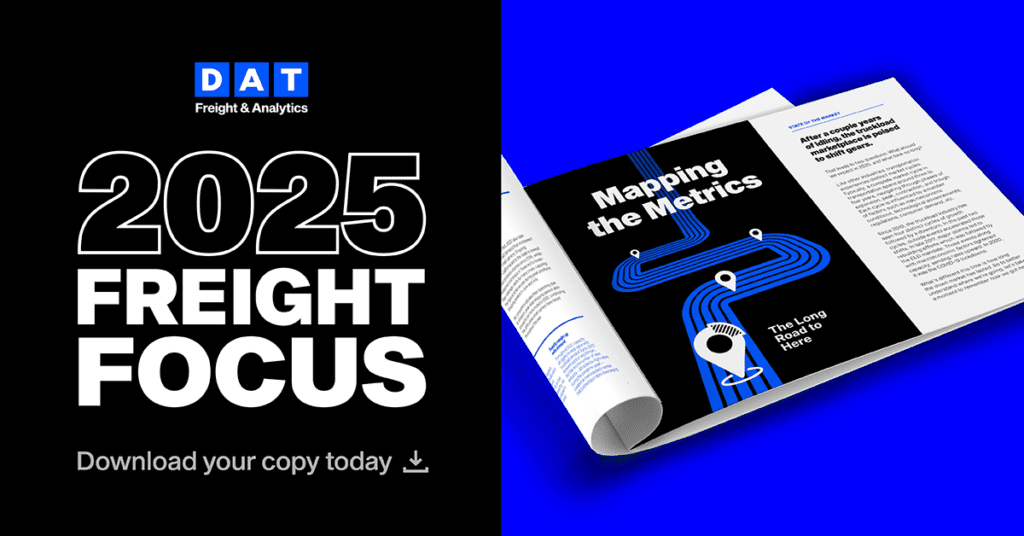General Mills has adopted shorter contracts and freight mini bids to handle increased demand during the pandemic.
In the past, the freight industry largely relied on traditional ways of doing business. But when the COVID-19 pandemic hit in early 2020, it quickly became apparent that the ways companies approach transportation procurement and freight bidding were going to have to change — and fast. Achieving agility in supply chain and transportation became a top priority. The companies that were able to adopt new approaches and strategies quickly were the ones that got an upper hand when trying to navigate the ever-changing market.
One such company is General Mills, whose leaders understood the importance of an agile supply chain as demand began shifting early in the pandemic. In an episode of the Freighvine podcast, DAT Chief Scientist Chris Caplice sat down with Phil West, Director of North America Transportation at General Mills, and Mark Purdy, Senior Manager of Dry National Transportation Strategy and Operations at General Mills. West and Purdy discussed what it’s like to manage transportation for a company whose demand went through the roof during an unprecedented time that transformed the ways many approach supply chain and transportation procurement.
Adapting to Uncertainty with Trucking Mini Bids
General Mills saw a huge spike in demand once the COVID-19 pandemic hit. As a food provider for both retailers/consumers and the industrial market, General Mills not only saw demand increase overall, but also a shift as restaurants closed and more people began working from home. That meant less demand for more portable foods, like granola bars, and higher demand for products that supported full meals.
To keep up, General Mills’ transportation leaders had to rethink some of their old ways of doing business, including everything from their modes of transportation to their freight bidding. By making adjustments like shifting from LTL to full-truckload and generally being more flexible about how goods get to their destinations, General Mills has been able to avoid some of the congestion facing other companies and ensure that customers receive their products on time.
Get your copy of the “Maximize Your Mini-Bid” eBook.

One significant way that General Mills adapted to the new demands of the pandemic is by embracing freight mini-bids as part of their procurement strategy. Mini-bids are short-term revisions to current transportation contracts that typically last between three and six months. Mini-bids let transportation procurement managers renegotiate freight contracts to reflect the actual market rate. They help shippers test new carriers, add new lanes to their portfolio, expand access to new supplier networks and more.
As General Mills looks to expand its supplier base by 20 percent, the flexibility of mini-bids has become an essential asset. In the past, the General Mills transportation procurement team had the luxury of time to fully understand the facility, including its characteristics, lane requirements and expected volumes. Now, increased demand and an expanded supplier base have transformed a process that used to last several months into one that lasts weeks or even days. Mini-bids help the company navigate that challenge with shorter contracts that address their current needs without having to make long-term commitments on lanes and facilities they are unfamiliar with.
To utilize mini bids effectively — and to navigate the unique challenges of the COVID pandemic — General Mills has to rely on a large amount of data. Because the company devotes a lot of time to data collection during their annual procurement process, they already have access to insights to help them scale with existing suppliers and set up new lanes and new suppliers.
In the case of new suppliers, the team takes a facility that is in a similar geographic location or that has similar lane characteristics and leverages it as a proxy when they go out to bid. Given that the proxy is unlikely to be perfect, General Mills then goes back and scrubs some of the rates that they got through their mini bid events. This enables them to better reflect on what they’re actually hauling or how they’re performing on a particular lane so that the data is more accurate for future bidding.
Maintaining Supply Chain Agility Moving Forward
Many of the changes that General Mills made to increase supply chain agility were in response to the immediate challenges of the COVID pandemic. Yet the success of these updates means the company has no plans to remove them in the immediate future. While General Mills plans to continue holding an annual procurement event, they also plan to utilize shorter contracts in some areas where they might be using new suppliers or where volumes are uncertain. That way, they can use data to reevaluate their contracts at shorter intervals to make sure they reflect what is happening in the market.
It’s thanks to the availability of real-time freight market data from services like DAT iQ that it’s possible to implement this kind of streamlined process for short-term contracts. Even if the company shifts away from mini-bids and shorter contracts once demand stabilizes, this data will still be useful when creating annual bids and contracts.
Whether or not mini-bids last forever, one holdover from the COVID-era that West and Purdy hope will continue is the increase in conversations with carriers and shippers. With so much uncertainty in the air in the past year, the General Mills team has been making a conscious effort to keep carriers updated on volumes. The company also offers quarterly updates to discuss whether contractual agreements from three, six or nine months before still make sense given the current market conditions. If they don’t, then General Mills can open up conversations that involve both shippers and carriers to find an appropriate solution.
As a whole, both West and Purdy believe that the pandemic has increased General Mills’ agility as an organization from top to bottom, creating many changes that are for the better. Looking forward, the procurement team will maintain this supply chain agility by embracing a willingness to make changes as needed.
Strengthening Carrier Relationships During Transportation Procurement
West and Purdy believe that General Mills’ strong business relationships have been central to the company’s success during the pandemic. With the shift to shorter contracts, it’s natural to wonder how General Mills has maintained their carrier relationships through this tricky time. Fortunately, their carriers have embraced the shorter term contracts. With so many unknowns facing all of the players in the supply chain, everyone has been more willing to take different approaches and try something new rather than risk getting the short end of the stick.
“The core carriers within our portfolio, they’ve continued to surge with our business. They’ve supported us on a lot of last minute requests and have been really transparent about where they can help or where they can’t,” says West.
Part of that support may be a response to the great driver experience General Mills aims to provide. After all, drivers have choices — especially during times like these when there are high demands for so many products. To be the shipper of choice for carriers that have many options, General Mills aims to provide a quality driver experience and an overall better driver network. For West and Purdy, focusing on driver and carrier relationships — as well as supply chain agility — will help them thrive in the long term, even after the current crisis has subsided.

